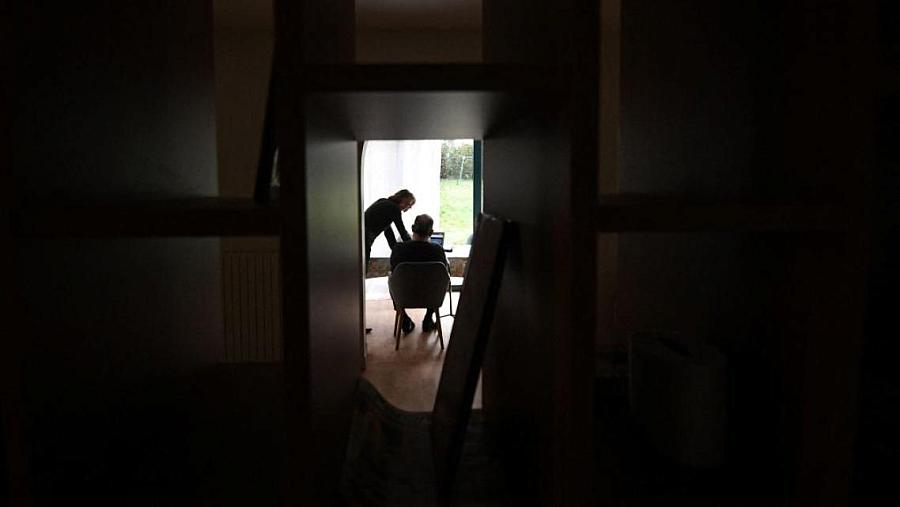Caregivers suffer a tremendous and unacknowledged burden. Does it have to be this way?

(Photo by Alain Jocard/AFP via Getty Images)
Few things are as upending as being thrust into a caregiver role for a loved one who is no longer themselves. For my mother, it was utterly consuming. My father had brain cancer, and my brother was schizophrenic; both were combative patients. My father refused to follow parts of the treatment plan, clinging to disbelief that this was his fate. My brother could turn violent. My mother bore the brunt of their anger as they suffered through their diseases.
At one point, my mother collapsed from the stress of caring for the two of them. She had no resources, no guidance in handling these newfound duties, and other than her other children, no form of support. She was one of the more than 65 million caregivers nationwide whose lives have been changed in caring for an ill, aging, or disabled loved one, according to the National Alliance for Caregiving and AARP. Many suffer from higher levels of depression, anxiety and stress compared than non-caregivers, according to the American Journal of Geriatric Psychiatry.
The cost of becoming a caregiver is often overlooked. Seventy percent of the lifetime cost of care is taken on by family members in the forms of unpaid caregiving and out-of-pocket expenses, for items ranging from medications to food, according to the Alzheimer’s Association. The cost of caring for those with dementia was an estimated $321 billion in 2022.
It is no wonder that caregivers are often overlooked: How can we put the bulk of our attention on caregivers when the person they stand behind is grappling with — and often losing to — a crippling disease affecting both mind and body? Becoming a caregiver can be incredibly isolating, with many losing human connection to the very person they’re caring for. We see this often with diseases like Alzheimer’s or brain cancer. The mental pivot can be jarring, with some caregivers saying they feel like they lose themselves in becoming responsible for the health of a loved one.
“You're on overload in every sense of the word,” Darcy Thiel, a Buffalo mental health counselor, told The Buffalo News in a recent report on caregiving. “You're coping with all of these in-the-moment things but you also know you're losing your person. That never leaves your mind.”
In the Coachella Valley, a popular retirement area in Southern California, our demographic skews heavily to the elderly. Compared to both the state and county averages, we have a higher number of seniors who are 60 or older, with this group making up more than 25% of the population. People are living longer than ever, which means more people with diseases into old age, which, in turn, means more people turning into caregivers. And with this comes caregiver burnout, now at its highest level because of the pandemic.
Out-of-pocket costs for caregivers are also worse for the Latino and African American communities, accounting for 47% and 34% of household income, respectively. And on the heels of the pandemic, the World Health Organization released a report finding that COVID-19 triggered a 25% increase in depression and anxiety worldwide.
The impact on caregiving in historically disenfranchised groups is disproportionate as well. Women and those in lower socioeconomic groups appear more vulnerable. Dementia caregivers harbor higher levels of stress, more depression and anxiety symptoms, and lower levels of subjective well-being. In addition, they experience worse physical health outcomes, including higher levels of stress hormones, greater medication use, and greater cognitive decline, according to the American Journal of Geriatric Psychiatry.
My project for the 2023 California Health Equity Fellowship will highlight the emotional and mental pains of a role now thrust upon millions of Americans, showcasing what lives suddenly changed can look like and what options might help this group in 2023. I’d like part of my project to be focused on solutions journalism, to see what other countries are doing to combat this issue and to explore how different cultural attitudes toward senior citizens may contribute to well-being in old age.
I’ll explore the desert’s caregiving community and share their stories. What is the reality of burnout? Should family be obligated to sacrifice their time — and even identity and sense of self — to care for another family member? Why are so many more young people being thrust into this role? What options did caregivers have in the past and what support system is there now in 2023?
My hope is that our reporting will create empathy as well as awareness of community and resources for caregivers. The character of a community can often be seen in how it treats its elderly and the people caring for them. That starts with helping the broader public understand the full picture of caregiving’s toll on mental health.

